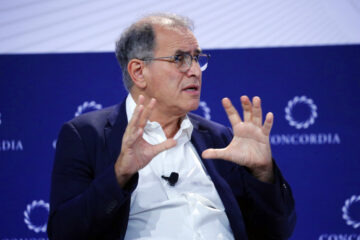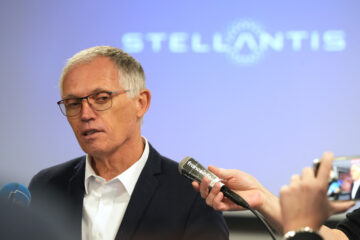In December 2023, California-based EV automaker Lucid (LCID) achieved a fantastic feat that only its rival Tesla (TSLA) could: producing a car worthy of Car and Driver’s prestigious 10Best list.
Among automotive staples like the 26-time winning Honda Accord and the fuel-efficient Toyota Prius hybrid, Lucid’s Air Pure was the lone electric vehicle on the automotive authority’s list of favorite cars.
Related: “Expensive” EVs offer a savings edge over cheaper gas cars: Study
In his writeup, C&D Associate Editor Austin Erwin said that the least expensive Lucid made him feel as if he were “holding a golden ticket instead of a coupon,” crediting its impressive range, performance, and space for the price.
With the achievement of such a feat, one might think that Lucid CEO and former Tesla engineer Peter Rawlinson might ease his foot on the throttle and let the glory sink in. However, he isn’t done innovating just yet.
2025 Lucid Air Pure
Lucid Motors
Lucid’s new Air Pure
For 2025, Lucid has given the lowest-priced Air sedan, the Air Pure, a series of upgrades that have made it the most energy-efficient vehicle ever made.
According to Lucid, the Air Pure is the first electric vehicle to achieve 5 miles of electric range per kilowatt hour, a feat supported by its EPA-estimated range of 420 miles out of a smaller 84kWh battery.
Compared to other vehicles, the company claims it requires less electricity to run while providing drivers with the kind of range to alleviate range anxiety. Additionally, a smaller battery uses fewer raw materials and has a smaller environmental impact.
Lucid’s battery dilemma
In an interview with CarBuzz, Lucid CEO Peter Rawlinson emphasized that the desire for his EVs to be more efficient comes from the fact that the batteries are the most expensive component.
While Tesla has sought ways to cut costs elsewhere, Lucid developed technology enabling more miles from smaller batteries. Therefore, they are able to save money on a component that would otherwise be very expensive to produce.
“For a family car [that is electric], over 40% of the cost of building that car is the cost of the battery,” Rawlinson said.
“The electric battery pack can cost $20,000. So, when others are looking at gigacastings, which might make $130 difference, […] I’m going for the jugular: the battery pack cost.”
Rawlinson further emphasized that Lucid’s technology is “an enabler” for making cars that are cheaper to build and sell.
“We got more range than anyone else with just an 88 kWh pack, which is smaller, lighter, and much less costly than the competition. And that’s why we can offer [the Lucid Air Pure] cheaper than Tesla.”
Related: Elon Musk’s sudden Trump endorsement can be bad news for Tesla
More Business of EVs:
Porsche and Mercedes diverge at EV crossroadsA Fisker-type problem is affecting an automaker known for qualityPolice officer pulls over Waymo robotaxi, is greeted by no driver or passengers
Lucid’s beef with BMW
In an attempt to further explain the importance of battery efficiency, the Lucid CEO targeted a popular EV made by one of his luxury competitors: BMW.
Rawlinson examined the Bavarian Motor Works’ i5 M60 electric sedan, which has a higher MSRP and a lower range than Lucid’s Air Pure. Though the car has a similar-sized battery as the Lucid, Rawlinson pointed out that the excess weight carried by the BMW renders one of its advertising taglines untrue.
“How many batteries do you need in the first place?” Rawlinson asked. “230 miles [of] range – requires an 84 kWh battery pack. We can get to 5 miles/kWh […], so we could get 230 miles of range with a 46 kWh battery pack.”
“That [German] car is no longer the ultimate driving machine because it’s got the weight of that battery.”
Although Rawlinson is slightly wrong about some figures, the i5 M60 has a 240-mile range from an 81.2 kWh battery pack, but he does have a point.
BMW’s electric “sports sedan” weighs 5,247 pounds, which is heavier than Volvo’s XC90 family SUV and the Ford Transit vans in which Amazon Prime packages are delivered. The big, heavy battery pack goes to waste and becomes dead weight.
“It’s not just the cost of the battery, it’s the weight, and it’s also the space and the legroom.”
Lucid Motors, which trades on the NASDAQ as LCID, is down 5.80% today, closing at $3.57 per share at the closing bell.
Related: Veteran fund manager picks favorite stocks for 2024


